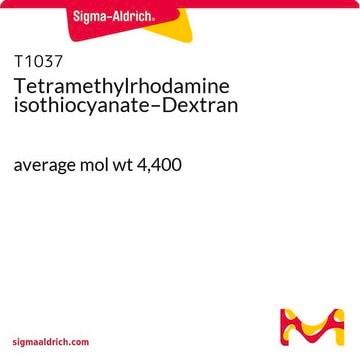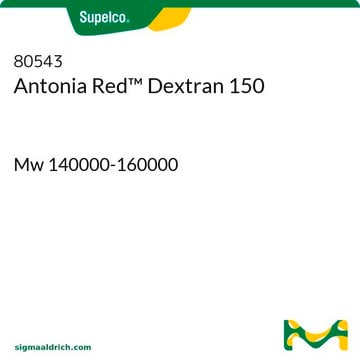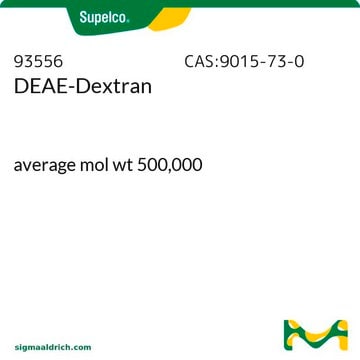52194
Tetramethylrhodamine isothiocyanate–Dextran
average mol wt 500,000
Synonym(s):
TRITC Dextran, TRITC-Dextran 500, TRITC-Dextran
About This Item
Recommended Products
biological source
synthetic
form
powder or crystals
mol wt
average mol wt 500,000
extent of labeling
0.001-0.008 mol/mol TRITC glucose
fluorescence
λex 550 nm; λem 575 nm±5 nm in 0.1 M Tris pH 8.0
application(s)
cell analysis
Looking for similar products? Visit Product Comparison Guide
General description
Application
Signal Word
Warning
Hazard Statements
Precautionary Statements
Hazard Classifications
Acute Tox. 4 Dermal - Acute Tox. 4 Inhalation - Acute Tox. 4 Oral - Eye Irrit. 2 - Skin Irrit. 2 - STOT SE 3
Target Organs
Respiratory system
Storage Class Code
11 - Combustible Solids
WGK
WGK 3
Flash Point(F)
Not applicable
Flash Point(C)
Not applicable
Certificates of Analysis (COA)
Search for Certificates of Analysis (COA) by entering the products Lot/Batch Number. Lot and Batch Numbers can be found on a product’s label following the words ‘Lot’ or ‘Batch’.
Already Own This Product?
Find documentation for the products that you have recently purchased in the Document Library.
Customers Also Viewed
Articles
Explore FITC-labelled polysaccharides and their properties, including impact of molecular weight on molecule dimensions.
Explore FITC-labelled polysaccharides and their properties, including impact of molecular weight on molecule dimensions.
Explore FITC-labelled polysaccharides and their properties, including impact of molecular weight on molecule dimensions.
Explore FITC-labelled polysaccharides and their properties, including impact of molecular weight on molecule dimensions.
Our team of scientists has experience in all areas of research including Life Science, Material Science, Chemical Synthesis, Chromatography, Analytical and many others.
Contact Technical Service









